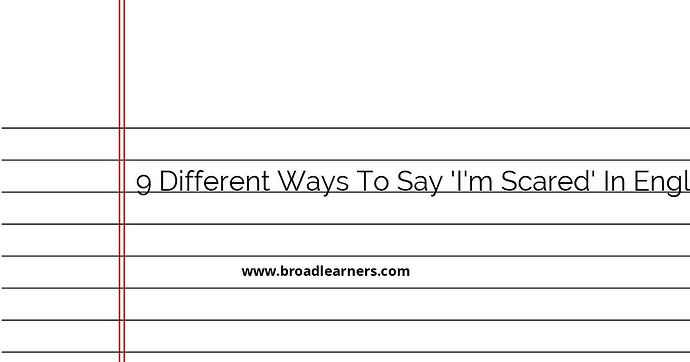When expressing fear or being scared, it's essential to have a variety of ways to convey your emotions effectively. Below are nine different alternatives to saying 'I'm scared' in English:
- I'm afraid: This phrase is a common and slightly formal way to express fear. It can be used in various situations to communicate your apprehension.
- I'm frightened: This term is typically used to describe a strong feeling of fear. It conveys a more intense sense of being scared.
- I'm terrified: When you are extremely scared or filled with terror, 'I'm terrified' is a suitable expression to showcase the level of your fear.
- I'm petrified: This phrase denotes being so scared that you feel paralyzed or unable to move due to fear. It implies a deep sense of dread.
- I'm spooked: 'I'm spooked' is a more informal way to express being scared or startled. It is commonly used in casual conversations.
- I'm panicking: This phrase conveys a sense of fear mixed with anxiety and a loss of control. It implies a more heightened state of fear.
- I'm apprehensive: When you feel uneasy or anxious about something, saying 'I'm apprehensive' is a way to express your fear or caution.
- I'm jittery: This term is often used to describe a nervous and fearful feeling that manifests physically through jittery movements or shaking.
- I'm trembling: When fear causes you to shake or tremble, saying 'I'm trembling' accurately conveys the physical manifestation of your fear.
Example: She was afraid of the dark and prefers to keep the lights on.
Example: The loud noise frightened the small child.
Example: The horror movie was so frightening; I'm still terrified.
Example: The height of the cliff made her feel petrified.
Example: The sudden noise spooked the cat.
Example: After getting lost in the maze, she started panicking.
Example: He was apprehensive about the upcoming exam.
Example: The suspenseful movie made her feel jittery and uneasy.
Example: The ghostly figure had her trembling with fear.
By incorporating these alternatives into your vocabulary, you can effectively communicate varying degrees of fear and apprehension in English.
Did I miss anything? Respond below
